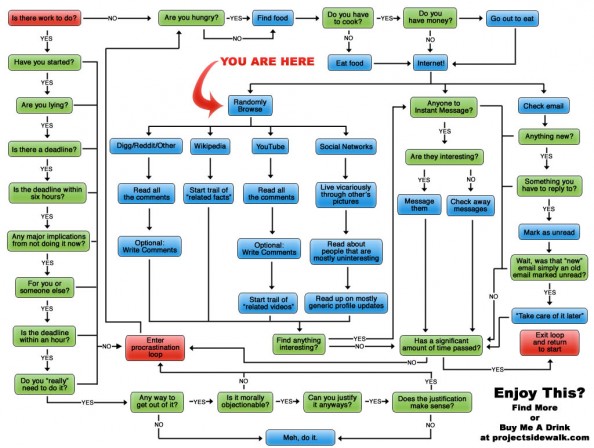We always complain that we don’t have time to complete all our tasks. But we don’t have the guts to admit the fact that it’s only our fault. Have no fear, there are ways to reduce our time-wasters.
Avoid procrastination
It usually occurs when a larger task is involved. This is your best false friend. Think about a time when you had to do an important project and you kept on stalling and postponing it with reading the paper or watching TV. “I’m burnt out” you’d say for comfort. “I need this to relax.” Or maybe you’d simply focus on other petty tasks that you have just to avoid all that heap of work. At a first glance looks as if we’re relaxing or even doing something productive, but actually you’re just looking for an excuse not to do it. 
Photo from procrastinusacademicus.
The cure for this modern disease? A forced diligence or simply break your project or task into smaller bits and take them one at a time. Of course, it’s crucial to start in due time. You will struggle at first, but with perseverance and discipline you will overcome this need.
Indiscipline will get you nowhere
Lack of discipline always turns against you. Find a way to organize yourself. Use post-it’s, agendas, calendars, whiteboards, papers stuck on your walls or simply walls or any combination of these elements that works for you. Don’t give up if you discover that you can’t manage and cope with them. It takes many tries until you find the most appropriate one for you.

Photo from officedeskss.
Being perfect and all
Many people don’t allow themselves to fail, though most of them can afford it. Consequently, they never expect anything less than perfection itself even when it comes to insignificant tasks. So they tend to take up everything simply because they don’t trust that the others will do as a good a job as they could. And of course they crash and burn while trying to handle everything.

Photo from karlmendes.
The key is to be self-conscious and to know what needs your attention and what can be delegated. Not everything needs your personal and undivided attention. And yes, people around you can do some of the things you don’t trust them with. Give it a try; you might actually be surprised.
Doing everything
This one goes hand in hand with perfectionism. How do you know when to delegate a task? And most importantly, which task should you delegate? Or even better, which tasks not to do at all. For example, cut down your unproductive activities. Yes, you all know what that means: less Facebook (you shouldn’t be spending 4 hours/day there unless it’s a job requirement), less TV (when you’re tired after a day’s work, simply put on some music or just take a nap) and less excuses for not having a good time management.

Photo from Innovative Performance and Pedagogy.
Some of you might have these problems. Some solved them, some are still working on them. Which thing do you have trouble with and how are you dealing with it?


Organizing and Prioritizing Techniques | Mole Empire
[…] about lacking. Truth be told, we don’t know how to deal with the time we have on your hands. Time management is all about prioritizing your tasks. Here you will find four methods to manage your tasks and time […]
No comments